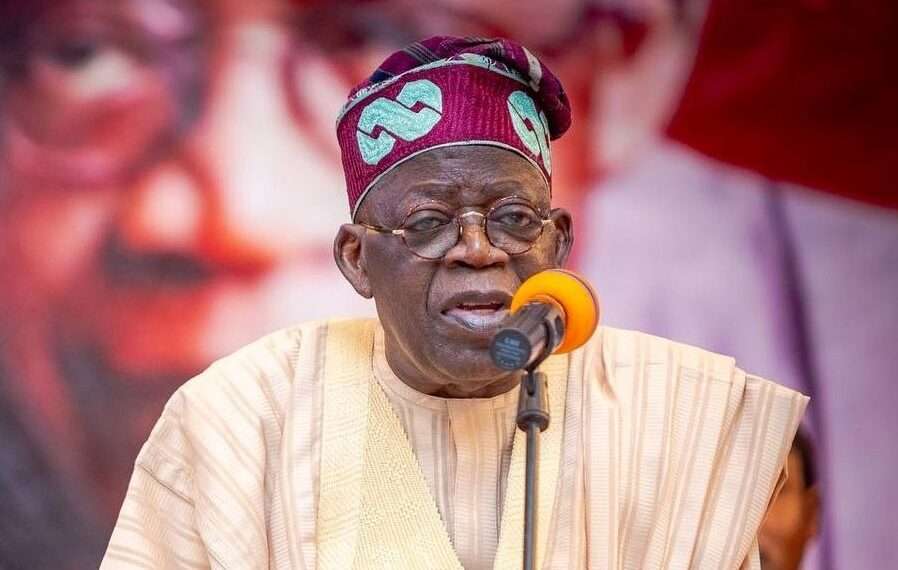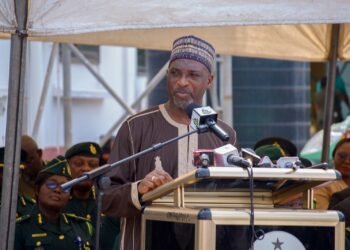President Bola Tinubu has publicly denied allegations that his administration is seeking to establish a one-party state in Nigeria.
The response comes amid growing criticism over the defection of key opposition figures to the ruling All Progressives Congress (APC), fueling concerns about shrinking democratic space in Africa’s largest democracy.
In recent months, several governors and federal lawmakers have abandoned their former opposition parties to join the APC. Abdullahi Ganduje, the party’s national chairman, further stoked controversy by stating that there was “nothing wrong” with Nigeria adopting a one-party system — a sentiment that has angered many within and outside the political class.
During his Democracy Day address to members of the National Assembly, Tinubu firmly pushed back against such notions.
“At no time in the past, nor any instance in the present, and no future juncture shall I view the notion of a one-party state as good for Nigeria,” Tinubu declared, adding that he would be “the last person” to advocate for abandoning Nigeria’s multi-party democracy.
His comments, however, have not silenced critics who believe that the government is already undermining opposition parties through coercive means and strategic inducements.
Protests Flare Over Governance and One-Party State Concerns
In Lagos, dozens of young protesters took to the streets, accusing the federal government of corruption and mismanagement. They claim the ruling elite is profiting from state resources while millions of Nigerians struggle to survive under difficult economic conditions.
According to Debo Ologunagba, spokesperson for the main opposition Peoples Democratic Party (PDP), the ruling APC is deliberately targeting opposition politicians using “compromised state apparatus”. He warned Nigerians to resist what he described as an anti-democratic agenda.
Nigerian law enforcement agencies have long faced allegations of selective prosecution, particularly in corruption cases, with critics pointing out that investigations and charges often focus on members of the opposition, while APC members enjoy protection.
Ologunagba was blunt in his assessment: “Nigerians should resist the plot to foist a despotic one-party regime in Nigeria.”
Interestingly, even some figures within the ruling party have voiced concern. Senator Ali Ndume of the APC warned against consolidating power in one party, arguing that it could damage the country’s political future.
“One-party dominance is a sign of the death of democracy. We need to have a system that makes it difficult for people to decamp.”
Senator Ali Ndume

Party Loyalty Still Lacking in Nigeria
Nigeria officially operates a multi-party system, but the political terrain remains heavily dominated by the APC and PDP. The APC, formed in 2013, promotes a blend of social conservatism and “Buharism”, while the PDP leans centre-right, advocating private sector-led economic growth.
Other significant parties include the Labour Party (LP), which champions social democracy, and the All Progressives Grand Alliance (APGA), which emphasizes nationalism and decentralization.
However, for many analysts, Nigerian political parties continue to function more as vehicles for acquiring power than as ideologically driven institutions. Frequent defections and weak party discipline have become common, making it difficult for voters to distinguish one party’s values from another.
Historically, Nigeria’s political history has been marked by regionally driven politics. During the First and Second Republics, the ideological divides between parties like the Northern People’s Congress (NPC), Action Group (AG), and National Council of Nigeria and the Cameroons (NCNC) were often overshadowed by ethnic allegiances.
Although recent years have seen attempts to define clearer ideological boundaries, especially since the 2019 elections, Nigeria’s democracy still faces the challenge of building parties rooted in principle rather than power plays.
















